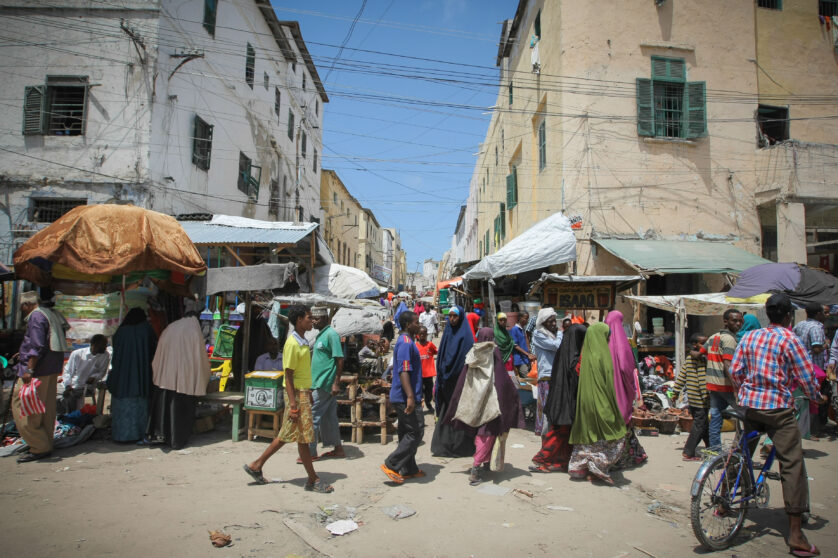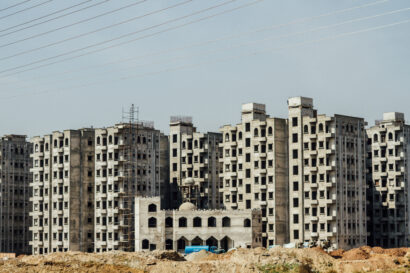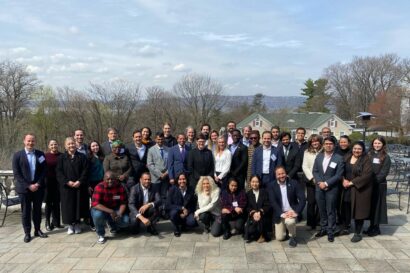Fragile contexts are home to 24% of the world’s population (1.9 billion people), and three-quarters (73%) of the world’s extreme poor. A brief prepared by the OECD notes that “domestic resource mobilisation (DRM) is a nascent agenda in contexts exposed to extreme and high fragility,” and makes specific recommendations for how the Fourth International Conference on Financing for Development (FfD4) can advance it. However, while the first draft of the FfD4 outcome statement includes a commitment to “enhance cooperation across the humanitarian-development-peace nexus,” nowhere does it make the connection between DRM and fragile and conflict-affected contexts.
Understandably, taxation is often treated as a secondary concern in such contexts —something to fix later, once peace has been secured and institutions have stabilised. Humanitarian and immediate service delivery goals take priority, while tax handles are often limited due to political and economic grounds for avoiding taxing already vulnerable communities.
But this misses a central point: taxation is not just about raising revenue. It is a cornerstone of governance, a building block of state capacity, and a critical lever for rebuilding trust between governments and citizens. When the state can collect taxes fairly and transparently, it signals legitimacy and authority. When it doesn’t, it can further sow divisions within society and sustain the conditions that fuel conflict.
Why donors should invest in tax systems in fragile contexts
While aid remains essential, donors must also invest in building strong domestic tax institutions. Without this foundation, efforts to foster stability, accountability, and sustainable service delivery and growth are likely to fall short—especially in a time of aid volatility. There are at least three compelling reasons why donors should prioritise investment in strengthening tax systems:
1. Tax is central to state-building
Taxation underpins state capacity, providing both the financial resources and the bureaucratic infrastructure necessary to perform core state functions—from delivering basic services to enforcing the rule of law and maintaining territorial control. Without an effective tax system, states struggle to function beyond capital cities. In fragile contexts where institutions are fragmented or newly reconstituted, building a tax system is not just about revenue—it is a foundational step toward creating a functioning state.
But taxation also shapes the relationship between state and society. When taxes are collected fairly and transparently, they can serve as a mechanism through which states engage with citizens, negotiate priorities, and build legitimacy. This is particularly important in post-conflict and low-trust environments, where the social contract has been strained or broken. Even modest progress in expanding equitable tax systems can help rebuild these connections, especially when linked to visible benefits and inclusive dialogue. For donors, this means recognising taxation not just as a technocratic challenge, but as a political tool for rebuilding trust and governance.
2. Unfair tax systems can reinforce social divisions
The design and implementation of tax systems carry not only economic significance but also profound political and social implications. While this is true everywhere, in fragile contexts poorly designed tax reforms can inadvertently exacerbate tensions and fuel renewed conflict if they are perceived as unfair or biased. Tax systems may be manipulated to deliver targeted benefits to specific groups, reinforcing inequality and exclusion. Even when applied uniformly, taxes can have unequal impacts—particularly if different communities or former combatants are concentrated in distinct economic sectors. In such contexts, neutrality in form can still result in perceived discrimination in practice.
Moreover, deep-seated mistrust between groups means that even well-intentioned reforms can spark contention if citizens suspect that they are being treated unequally. These dynamics highlight the critical need for donors and policymakers to prioritise transparency, inclusiveness, and equity in tax reform—recognising that taxation is a potential fault line in fragile political settlements.
3. The prevalence of informal and armed group taxation can undermine peace- and state-building
In many fragile contexts, the state is not the only—or even the primary—taxing authority. Armed group taxation is widespread, playing a role in fuelling violence and conflict and shaping the landscape of post-conflict fiscal and governance realities. But armed actors do not only tax to support their war efforts; they also do so to build legitimacy, govern populations, and perform public authority. This can divert power away from the state, complicating post-conflict recovery and peacebuilding efforts.
At the same time, in contexts where state presence and authority are limited, informal institutions and non-state actors—including traditional authorities—often play a large role in taxation, service provision, and local governance. In Somalia, for example, while al Shabaab operates a sophisticated tax bureaucracy, clan-based authorities also fund local governance and community development through forms of informal revenue generation. These informal systems can become deeply entrenched over time, representing potential spoilers for post-war reform efforts.
How donors can support peace- and state-building efforts by investing in tax systems
While aid remains essential in fragile settings, it can inadvertently disincentivise domestic revenue collection if not deployed thoughtfully. When governments rely heavily on external financing, the political incentives to invest in broad-based, sustainable tax systems may be diminished. But this outcome is not inevitable.
With strategic investments, aid can play a catalytic role—helping to build the administrative capacity, political will, and public trust needed to develop effective, accountable tax institutions. For donors committed to long-term peace- and state-building, supporting domestic revenue mobilisation must be part of the solution. Evidence points to four areas where donor investment is likely to generate meaningful and lasting impact:
1. Supporting both national and subnational administrative capacity
Investing in tax administration capacity is essential in fragile contexts. Significant capacity constraints in these contexts often undermine the feasibility of technically ambitious reform agendas. And these capacity constraints are often particularly acute at the subnational level, where most individuals engage with the tax system.
Meanwhile, while decentralisation is frequently promoted as a peace-building strategy, intended to give greater autonomy to rival groups or regions, it rarely aligns with the practical realities of local tax collection. In many cases, local government capacity is minimal and deeply shaped by local political dynamics that reform efforts too often overlook.
Rather than simply transferring fiscal responsibilities downward, donors and governments must prioritise long-term investments in national but also local administrative capacity—an area that has historically received insufficient attention from international actors. Focusing in particular on property taxation—in a transparent, fair, and progressive manner—may be a particularly promising way to start. Without this, decentralisation risks overpromising and underdelivering, undermining citizen expectations of the state and further weakening state legitimacy at the local level.
2. Building trust in the tax systems through “services first” approaches
Building trust is central to effective taxation in fragile contexts. Where legitimacy is weak and institutions are contested, citizens are unlikely to support tax systems they view as unfair, opaque, or extractive. Yet public trust in taxation is not fixed. A “services first” approach, where service delivery precedes or accompanies tax expansion, can help break the low-trust, low-compliance cycle that is common in many fragile settings—and lower income contexts more generally.
Donors have a key role to play in breaking free from this low-tax, low-capacity trap. This may include investing in hybrid financing models that link taxation to service delivery—even when the government itself is not the primary funder. Investments in tangible public goods, even when modest, help establish a relationship of trust and expectations of reciprocity between citizens and the state. Evidence from Somalia suggests that when governments are involved in delivering visible public services—even where those services are funded by donors or through hybrid financing models—citizens may become more willing to pay taxes and to engage with state institutions.
Further, an emphasis on rules-based policymaking, transparency, and visible equity—in both tax burdens and benefits—can help reduce perceptions of bias and prevent reform backlash. Donor support of taxpayer education and transparency initiatives can help strengthen the fairness—and the perception of the fairness—of tax systems. In fragile contexts, such support acknowledges that taxes must serve to rebuild fractured relationships—not just raise revenue.
3. Recognising—and sometimes working with—informal tax systems
Despite their prevalence, informal and non-state systems of taxation are often overlooked in peace- and state-building efforts. When misunderstood or left unaddressed, these systems can become entrenched and weaken the state’s fiscal authority. For this reason, understanding the realities of existing fiscal institutions is a necessary first step in efforts to strengthen formal tax systems.
Donors and governments must recognise that the goal is not always to eliminate informal systems, but to understand them and, where appropriate, engage with them pragmatically. In some cases, by working with rather than against existing informal authorities, donors can help build more inclusive and resilient fiscal systems from the bottom up. In Somalia, for example, hybrid financing strategies involving donors, municipal governments, clan leaders, and informal tax institutions have successfully co-financed infrastructure and service delivery projects, without undermining trust in the state. In both Sierra Leone and the Democratic Republic of the Congo, local governments that work with traditional authorities have seen improvements in local revenue collection.
These arrangements can help overcome capacity constraints while better ensuring that informal institutions are accountable and transparent. Technocratic models of ideal tax systems may need to be tempered to reflect on-the-ground political realities—but without sacrificing longer-term goals of strengthening institutions and state legitimacy.
4. Support research on tax in fragile contexts
While there is growing evidence on how to strengthen tax systems in fragile contexts, critical knowledge gaps remain. Donors should prioritise funding research that deepens understanding of the informal and illicit revenue systems that often arise during conflict and how these shape conflict dynamics, prospects for peace, and state legitimacy. Recent collaborative initiatives—such as ICTD’s work with the Danish Institute for International Studies (DIIS) on informal taxation and roadblocks in fragile contexts, as well as the launch of a new ICTD and Centre on Armed Groups project to build a global dataset on armed group taxation—offer promising foundations to build on.
Second, more evidence is needed on the trade-offs and tensions inherent in taxation in fragile contexts. While tax can build connection between state and society, it can also deepen divisions when perceived as unfair. Context-specific research can help clarify when and how to sequence reforms, which groups are most affected, and how tax design can balance goals of technical efficiency with social cohesion.
Finally, politically aligned reforms require politically grounded research. Effective tax reform requires understanding of local political settlements, elite bargains, and conflict legacies. Without this, reforms risk reinforcing existing inequalities or triggering backlash. Donor support for context-sensitive, policy-relevant research is thus essential to ensure that tax initiatives contribute to both peace- and state-building goals.
Resilience through revenue: Why donors must support taxation in fragile states
Taxation is not just a technical exercise—it is foundational to building state legitimacy, restoring the social contract, and securing long-term peace. Fragile states cannot be sustained through aid alone. They need the capacity—and crucially, the incentive—to engage with citizens through taxation. Donors must go beyond short-term service delivery and invest in fair, transparent, and politically grounded tax systems. Doing so is essential not only for funding development, but for enabling the kinds of states that can deliver it.



